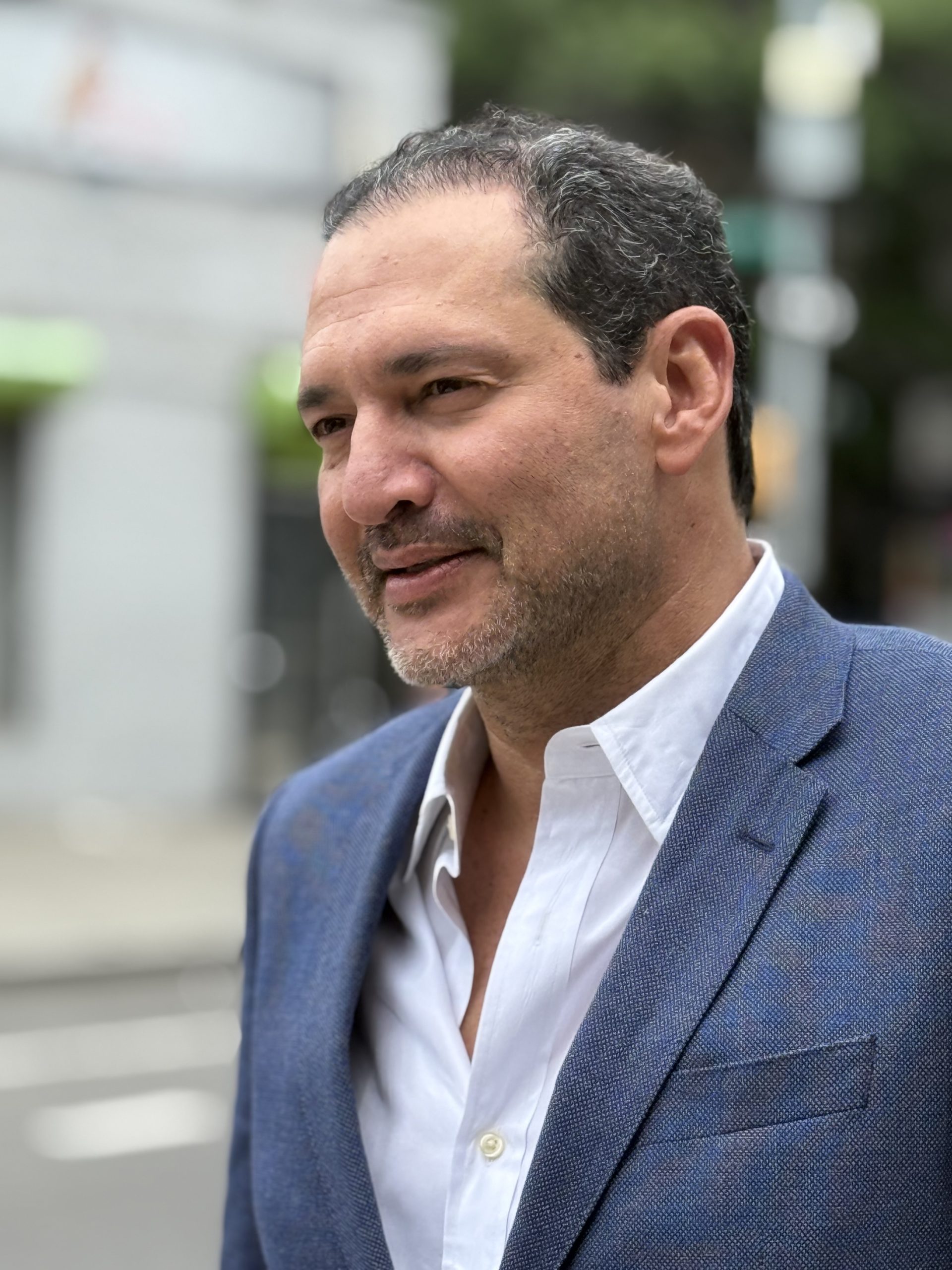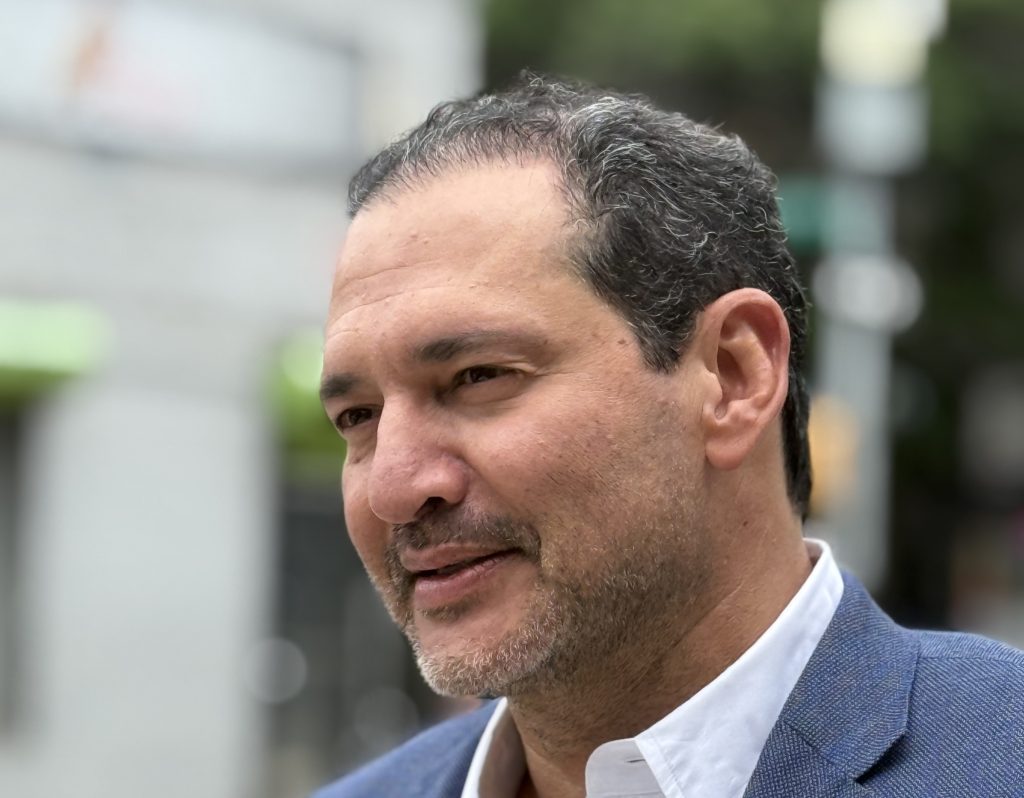
Joseph Hernandez stopped by the Ledger’s offices last week to talk about his mayoral campaign.
By JACK DELANEY | jdelaney@queensledger.com
New York City’s mayoral brawl has another boxer.
Joseph Hernandez, a hyper-educated scientist and prolific investor, is running for mayor as an independent on a centrist platform that includes hiring more police officers, raising salaries for teachers, and integrating artificial intelligence into the fabric of the city.
Though Hernandez’s campaign started only a month ago, it’s already gained a surprising amount of traction: his team aimed for 4,000 petitions and ended up with over 15,000, plus endorsements from industry associations for bodegas, small businesses, and supermarkets.
Hernandez, a late entrant to a field of buzzy names — Andrew Cuomo, Eric Adams, Curtis Sliwa, and Zohran Mamdani — is still a long shot. But he likes it that way, at least for now: “I was born an underdog,” he told the Ledger.
In Hernandez’s case, that’s no hyperbole. Born in Camagüey, the third-largest city in Cuba, much of his family fled in 1959 when Fidel Castro came to power. Yet his dad, a businessman, stayed, a decision that proved fateful when he ran afoul of the regime and fell into an encephalitis-induced coma for six months while in prison.
The family joined a mass exodus to the U.S. in 1980, but had to start from scratch. His father recovered enough to wash dishes, while his mother cleaned homes. Only a few decades later, however, their son would be a successful biotech financier with five degrees — and in contention for NYC’s top job.
“[My parents] taught us to work hard, to have faith, to get educated, and to love our adopted country,” recalled Hernandez. “That, they said, would change the course of my life. And they were right.”
More Police, Cheaper Housing
To this day, Hernandez expresses an unshaken belief in the American Dream. But in an echo of Cuomo’s messaging, his current assessment of New York is grim: “We think the city is unsafe,” he said, highlighting what he viewed as lenient sentences for violent crimes. “There’s no law and order.”
If elected, Hernandez plans to hire an additional 10,000 police officers — the NYPD currently has about 35,000 uniformed employees — and foot the bill by reforming the department’s overtime pay, a hot-button issue.
If Hernandez views public safety as mostly doom, the affordability crisis is all gloom. Like Mamdani — who has campaigned on a promise to freeze rents — he stressed the urgent need to lower housing costs, though he disagreed over the fix.
“He’s not wrong,” Hernandez said of Mamdani. “This city is expensive. [Especially] if you’re a young person — no question about that. But I don’t think it’s a rent control issue. It’s a supply issue; it’s a very basic economic question.”
As mayor, Hernandez’s strategy would be to speed up the conversion of empty offices into apartments, while reducing the length of time that affordable units distributed through the city’s online portal sit unoccupied.
All-In On AI
Nuances aside, Hernandez’s positions on policing and housing are unlikely to turn heads in a campaign cycle saturated with similar platforms. What might is his heavy focus on tech, and the resume he brings to back it up.
Hernandez received three degrees from the University of Florida — a bachelor’s in neuroscience, and graduate diplomas in molecular genetics and finance — before studying epidemiology at Yale and public health at Oxford.
From there, Hernandez worked at the pharmaceutical giant Merck, and would go on to found at least eight companies tackling a range of diseases, including Alzheimer’s and Covid. (In 2020, he also helped fund an early attempt to sequence the genome of the dodo bird, in hopes of reviving the species.)
Those experiences help inform Hernandez’s sense that New York City could benefit from a more high-tech approach to government. Since moving to the city in 2011, he’s observed a wide array of possible applications for artificial intelligence, some of which have been adopted by metropolises like Dubai and Singapore: traffic light synchronization, garbage pickup, pothole management, and predicting crime, among others.
Beyond city services, Hernandez aims to make NYC a global hub for AI. “New York City has some of the cheapest power, because of Niagara Falls,” he noted. “We can compete better than any other city for AI and high-energy consumption technology. There’s no reason why we shouldn’t be a center of excellence: create jobs, create opportunities, and create the next generation of AI kids who live in Queens and Harlem.”
As cities around the world rush to cash in on the AI boom, many have been forced to confront an uncomfortable fact: the technology requires data centers that guzzle water and energy on a massive scale. Consider Ireland, where “dozens of massive data centers humming at the outskirts of Dublin are consuming more electricity than all of the [country’s] urban homes,” wrote the AP last December, and are “starting to wear out the warm welcome that brought them here.”
But Hernandez argues that issues such as water usage will eventually be solved, and that data centers and server farms are net positives, despite concerns. The same goes for AI itself, which he maintains would reduce inefficiency: “On the privacy side, you have to be sensitive. You have to listen to people about this,” he said. “But at the end of the day, it’s a technology you have to embrace.”
Suing the City for Ranked Choice
While Hernandez is confident that there’s still time to reach voters with his message, last week his campaign upped the ante by suing the city over what it views as an unfair impediment to independent candidates: the lack of ranked choice voting (RCV) in the general election.
In 2019, New Yorkers voted to adopt a new system for primaries, which allows residents to rank up to five candidates rather than choosing only one. Supporters of the change said that it would boost turnout and reduce attack ads, as candidates could benefit from forming alliances. Others asserted that it would diversify voters’ options, by giving them the peace of mind to vote for the candidate they truly wanted, not just the one they believed had a chance to win.
However, the system was not extended to the general election, a decision Hernandez said violates both state and federal law.
“A two-tiered election system is fundamentally unfair,” he expanded. “Every New Yorker deserves a vote that counts, and every candidate deserves a level playing field—regardless of party affiliation. RCV ensures majority support and real choice. Without it, the system is rigged in favor of political insiders.”
The general election will take place on November 4. The last day to apply online or by mail is October 25 — early voting starts that day, and continues through November 2. For more information, visit vote.nyc.



